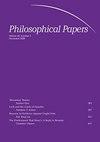认识上的非殖民化:克服欧洲中心主义的解释学不公正
IF 1.3
3区 哲学
0 PHILOSOPHY
引用次数: 13
摘要
摘要本文广泛关注的问题是,认知非殖民化可能涉及什么。它分为两个部分。第一部分首先解释了要求认识非殖民化的具体认识问题。我认为,呼吁非殖民化的动机是一种公认的认识危机,即主导的欧洲中心范式不足以正确地将我们的现代世界理论化。然后,我讨论了两个一般性的建议,激进的和温和的,关于认识非殖民化可能涉及的内容。在第二部分中,我认为以欧洲为中心的认识资源的不足构成了一种不可简化的认识压迫形式所造成的解释学不公正。然后,我认为,解决这种形式的认识压迫需要在欧洲中心范式之外进行思考,因为该范式可能无法揭示和解决维持它的认识压迫。这为激进的观点提供了进一步的合理性,即认识非殖民化必须涉及从欧洲中心范式以外进行思考,但也包含了一种温和的建议,即对欧洲中心思想采用批判性观点是认识论非殖民化的重要组成部分。本文章由计算机程序翻译,如有差异,请以英文原文为准。
Epistemic Decolonization as Overcoming the Hermeneutical Injustice of Eurocentrism
Abstract This paper is broadly concerned with the question of what epistemic decolonization might involve. It is divided into two parts. The first part begins by explaining the specifically epistemic problem to which calls for epistemic decolonization respond. I suggest that calls for decolonization are motivated by a perceived epistemic crisis consisting in the inadequacy of the dominant Eurocentric paradigm to properly theorize our modern world. I then discuss two general proposals, radical and moderate, for what epistemic decolonization might involve. In the second part, I argue that the inadequacy of Eurocentric epistemic resources constitutes a hermeneutical injustice caused by an irreducible form of epistemic oppression. I then argue that addressing this form of epistemic oppression requires thinking ‘outside’ of the Eurocentric paradigm because the paradigm might fail to reveal and address the epistemic oppression sustaining it. This lends further plausibility to the radical proposal that epistemic decolonization must involve thinking from ‘outside’ the Eurocentric paradigm, but also accommodates the moderate proposal that adopting critical perspectives on Eurocentric thought is an important part of epistemic decolonization.
求助全文
通过发布文献求助,成功后即可免费获取论文全文。
去求助
来源期刊

Philosophical Papers
PHILOSOPHY-
CiteScore
2.10
自引率
0.00%
发文量
18
期刊介绍:
Philosophical Papers is an international, generalist journal of philosophy edited in South Africa Original Articles: Articles appearing in regular issues are original, high-quality, and stand-alone, and are written for the general professional philosopher. Submissions are welcome in any area of philosophy and undergo a process of peer review based on initial editor screening and refereeing by (usually) two referees. Special Issues: Topic-based special issues are comprised of both invited and submitted papers selected by guest editors. Recent special issues have included ''Philosophy''s Therapeutic Potential'' (2014, editor Dylan Futter); ''Aging and the Elderly'' (2012, editors Tom Martin and Samantha Vice); ''The Problem of the Criterion'' (2011, editor Mark Nelson); ''Retributive Emotions'' (2010, editor Lucy Allais); ‘Rape and its Meaning/s’ (2009, editor Louise du Toit). Calls for papers for upcoming special issues can be found here. Ideas for future special issues are welcome.
 求助内容:
求助内容: 应助结果提醒方式:
应助结果提醒方式:


